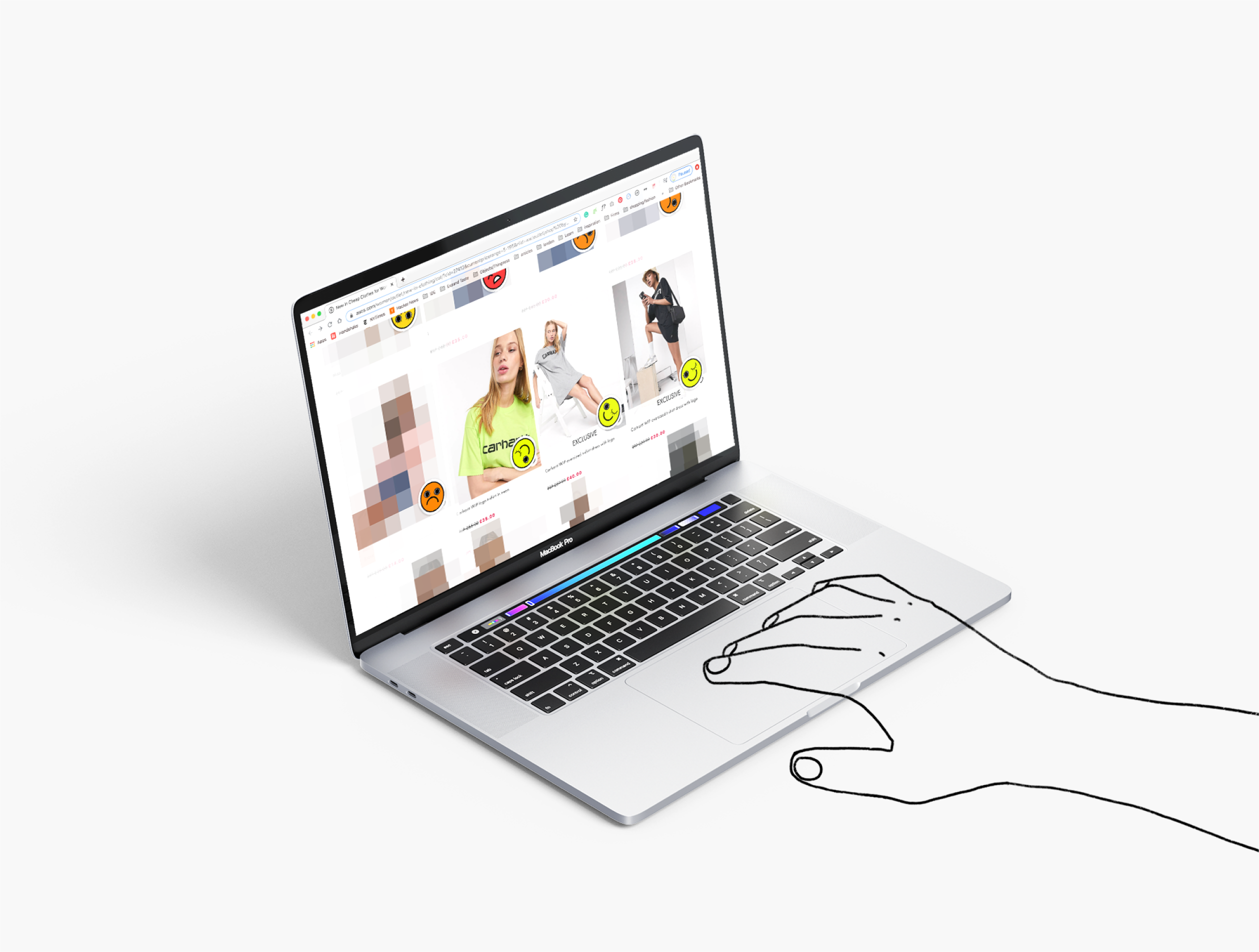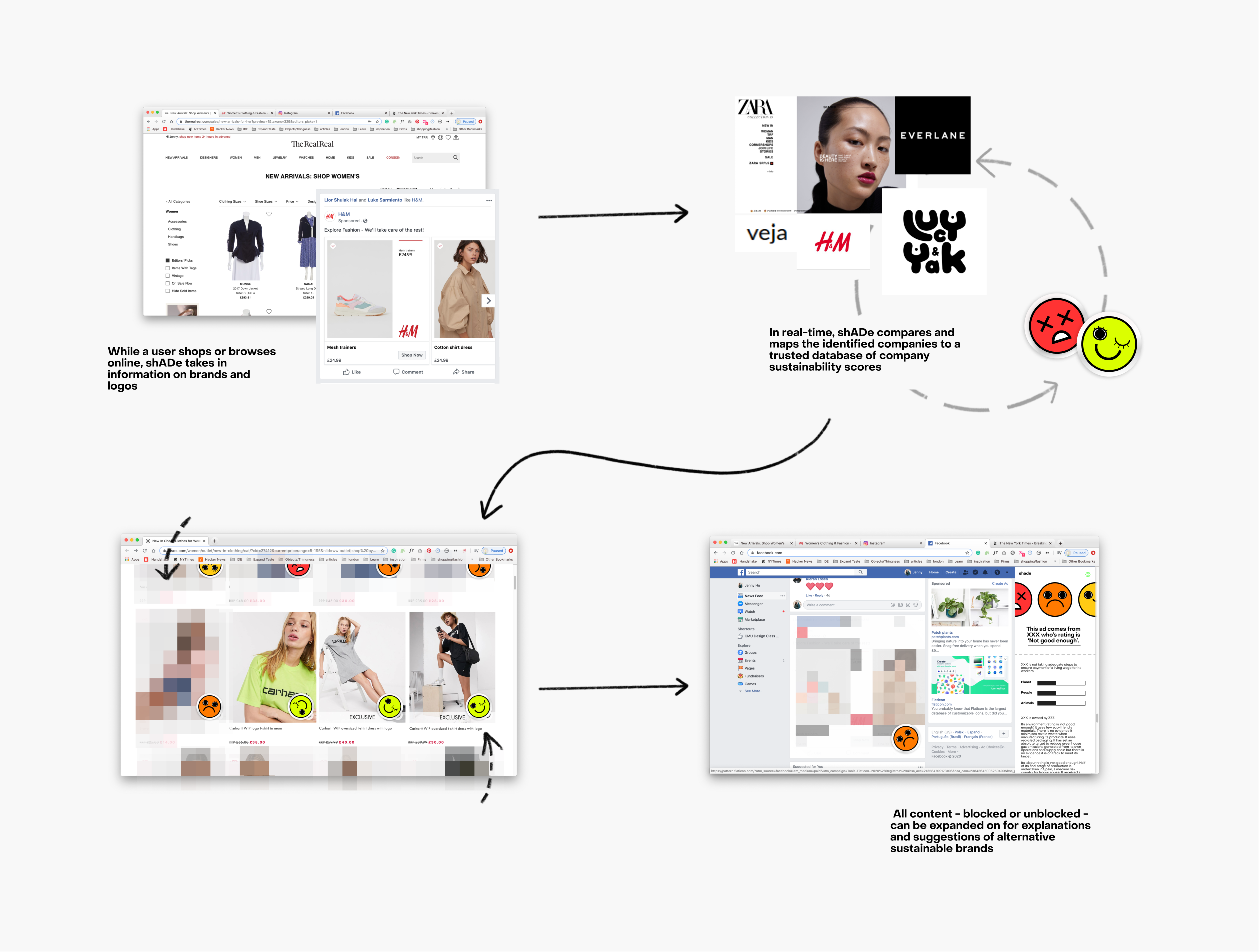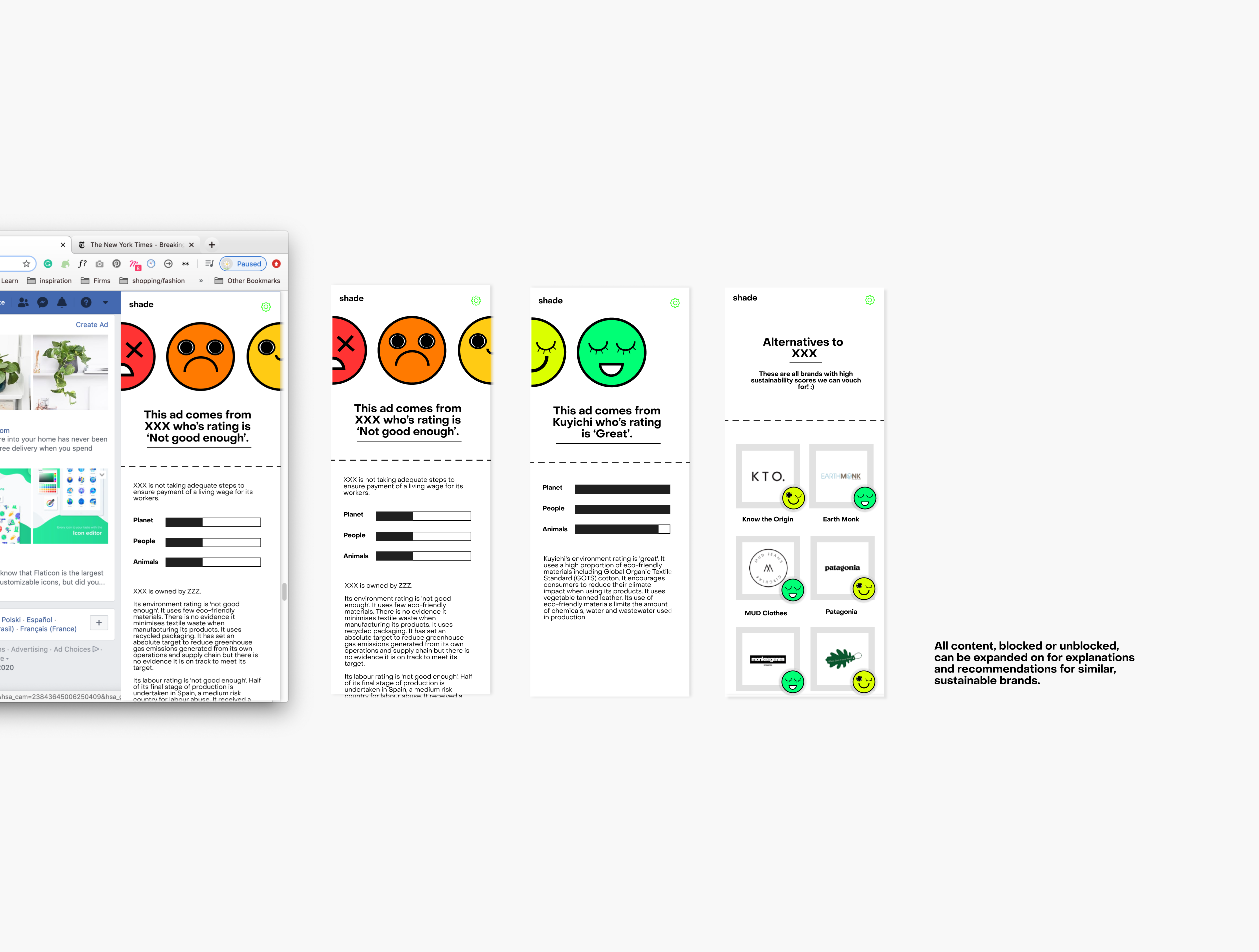shADe

Useful information
- Team members
- Fatimah El-Rashid Jenny Hu Samurai L. Sille Eva Bertelsen
- Country
- United Kingdom
- Keywords
- Fashion Climate Action Responsible Consumption Online Retail Sustainability Web Extension Greenwashing Digital Transparency Sustainability
Short Description
shADe is a web extension that uses data to block digital marketing from unsustainable fashion brands
Detailed Description
shADe aims to halt fast fashion through disruptive digital protest against greenwashing. With shADe, unsustainable companies are blocked while sustainable companies are celebrated, encouraging users to make responsible fashion choices that hold bad-actor companies accountable. shADe is unique as a free-to-install subversive tool that targets players in the fast fashion industry. Although there are many ad blockers available on the market, none of them combine selective blocking with business ethics, which are sourced from a trusted database informed by sustainability audits. This enables shADe’s subtle, minimally-intrusive interface to break the barrier between users and insider information about the fashion industry while allowing users to take control of their shopping experience. Let’s change the fashion industry together with shADe.
shADe is in development and only made possible with contributions from Joy Z and Good On You.
Project Details
- Does your design take social and cultural challenges and human wellbeing into consideration?
The negative environmental, social and cultural implications of fast fashion are increasingly being recognised worldwide. As global attention turns towards sustainability, greenwashing has become a deceptive marketing strategy to promote and sell goods in the fashion industry by exploiting consumers’ environmental and social concerns. As consumer choices play a key factor in market demand and production, this can result in detrimental environmental and social impacts. Left unaddressed, the active disinformation of fashion companies to promote unsustainable goods stands to numb good intentions of individuals, enabling a deeper spiral towards irreversible damage. The lack of transparency from fashion brands has left consumers with little ability to understand and take action. Today, users must dedicate large amounts of time to make informed choices. There is no seamless process, which bridges the information gap between reliable sources and real-time shopping.
That’s why shADe gives users relevant information about a brand’s sustainability performance while they shop. This directly hands power back to society to make choices that align with their values. As such, shADe is a proactive tool that goes beyond educating users, but also mobilises them to vote with their spending, holding fast fashion companies accountable for their triple bottom line - environmental and social as well as financial. Given the current shift towards conscious consumerism, the fashion industry will have no choice but to evolve their practices to become more sustainable.
- Does your design support sustainable production, embodying circular or regenerative design practices?
Fast fashion is a hugely complex, systemic challenge, in which those causing the problem are supposedly solving the problem. It is an alarming sign of an urgent need for change, and over the last several years, we have witnessed Fashion Weeks across Europe - Berlin, Copenhagen, London and Paris - calling for fashion leaders to collectively tackle unsustainable practices inherent in the industry.
shADe works alongside and aims to help halt fast fashion through disruptive digital protest. By shifting the power away from fashion brands and into the hands of consumers, shADe sends a clear message that sustainable practices, not messages, are the only way forward. shADe’s mission is directly in line with the 12th UN Sustainable Development Goal, which is to “ensure sustainable production and consumption patterns” as it is a proactive tool that not only educates consumers but also helps them improve their environmental footprint, and collectively helps make fashion greener.
- Does your design use principles of distribution and open source?
Providing access to sustainability performance information of fashion brands is an essential part of shADe. This information is gathered from Good On You - a trustworthy database of fashion brand ratings. shADe users are given relevant information about a brand’s sustainability performance at the critical moment of online shopping. Current platforms meant to educate consumers require long-term commitment to study and change personal behaviour. There are no web platforms that surface trusted information about brands consistently while shopping. We provide a seamless interaction platform that directly elevates the audited information in real-time.
The design of shADe is unique in that it doesn't shy away from promoting positively ranked brands over others. This can be seen in our ad-blocking component, where brands given rankings of “not good enough” and “we avoid” are given corresponding negative visualisations. Although there are many ad blockers available on the market, none of them combine selective blocking with business ethics, which are sourced from a trusted database informed by sustainability audits.
We believe surfacing relevant information about a brand’s sustainability performance while they shop gives power back to the individual to make choices that align with their values. Doing so mobilises people to vote with their spending, holding companies accountable for their triple bottom line.
- Does your design promote awareness of responsible design and consumption?
Every year, consumers increasingly choose to shop with brands that align with their values, whether it be environmental or social. In 2020, online retail sales in the UK were estimated to reach nearly GBP 100 billion, with 55% of the goods or services purchased being in the clothes, shoes, and accessories category. As a consequence to both trends, brands deploy greenwashing marketing strategies which focus on values like sustainability and ethics, without processes that hold them accountable to their promises. Consumers are largely unaware of what is true and what is not.
Through our development of shADe, user involvement showed that the best practices for minimising one’s environmental damage is to consume as little as possible, but individuals committed to this mission are often extreme and a small part of the population. Unless it is made easier for the single individual to learn and take action, it is likely that they will never change their behaviour.
shADe promotes awareness by making this information directly visible to consumers on their web browser and easy to act on to learn more. The vision for shADe is to develop a steady companion for long term engagement with users, promoting alternatives as an e-commerce space for brands with positive or low-carbon footprints.
Images


